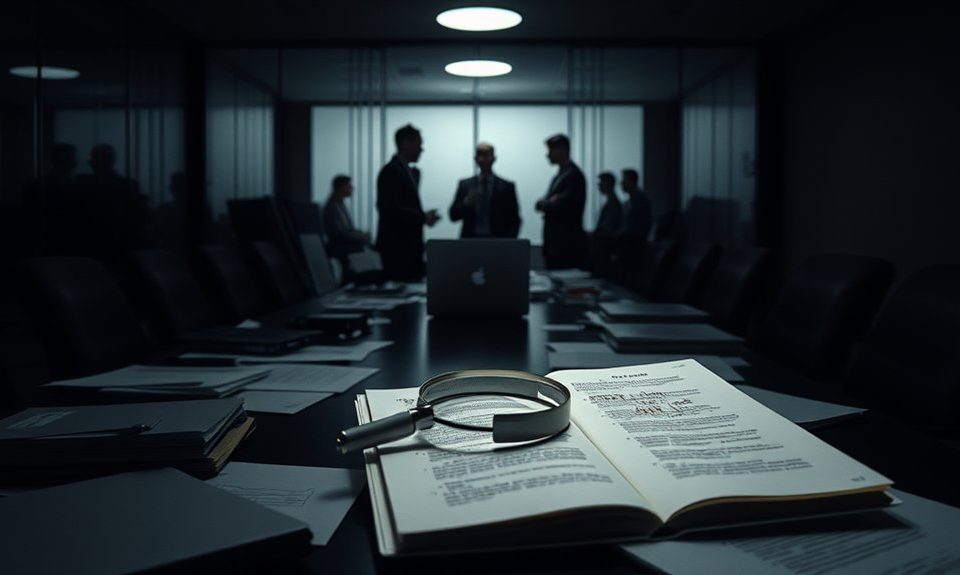Corporate investigations are essential for safeguarding businesses against various threats, including embezzlement, corporate espionage, and intellectual property theft. Trust can be easily compromised, making it crucial for organizations to understand the purpose and scope of corporate investigations. This article explores the types of corporate crimes that can jeopardize your assets, the importance of conducting thorough investigations, and the diverse techniques employed by professional investigators to uncover the truth. We will guide you through the investigative process and provide tips on how to effectively collaborate with corporate investigators to protect your business’s most valuable assets.
Key Takeaways:
The Role of Corporate Investigators
Corporate investigators play a vital role in maintaining operational integrity and upholding ethical standards within organizations. They are responsible for identifying and addressing employee misconduct, workplace harassment, financial misconduct, compliance violations, and other workplace incidents.
As corporate environments become increasingly complex, the demand for professional investigators has grown, particularly in Myrtle Beach, SC, and nearby areas such as Columbia, Rock Hill, Lexington, and Charleston.
Since 1991, Stillinger Investigations has collaborated with businesses to help protect their brand and mitigate risks associated with corporate crimes.
Understanding the Purpose and Scope of Corporate Investigations
The purpose of corporate investigations is to uncover the truth behind allegations of employee misconduct, financial improprieties, compliance violations, and other violations that could jeopardize an organization’s reputation and operational efficiency.
These investigations play a crucial role in ensuring workplace safety, compliance with industry regulations, and preventing financial losses due to employee theft.
For instance, if a company suspects that an employee is committing fraud by altering financial records or misappropriating cash, an internal investigation can help reveal the facts, enabling the company to take appropriate action.
When incidents of workplace harassment occur or safety violations are suspected, a corporate investigation can provide critical information that may lead to policy changes or the development of training programs. Additionally, employee background checks are an essential aspect of corporate investigations, as they help prevent the hiring of individuals with a history of misconduct.
Types of Corporate Crimes
Corporate crimes encompass a broad range of illegal activities directed at a company, including fraud, embezzlement, employee theft, and corporate espionage.
These actions can significantly impact a company’s financial performance and reputation.
Embezzlement, Fraud, Intellectual Property Theft, and More
Embezzlement, fraud, and theft of intellectual property are prevalent forms of corporate crime that pose significant threats to businesses, often leading to financial losses and reputational damage. Other risks include workplace harassment and discrimination claims, which can also have a profound reputational impact.
Such crimes can erode trust and expose businesses to additional risks if the vulnerabilities that allowed the crimes to occur are not addressed. Therefore, it is essential to understand the distinct characteristics and approaches associated with each type of crime to develop effective detection and prevention methods.
Implementing internal controls, conducting regular audits, and adopting other proactive practices are crucial for identifying potentially fraudulent activities at an early stage. Techniques like forensic accounting and surveillance play a vital role in fraud detection and risk management. Equally important is fostering a corporate culture of openness and ethical behavior, which helps to mitigate the likelihood of such issues arising.
Internal investigations play a vital role in the overall strategy against corporate crime, as they enable organizations to swiftly reduce the risks and harms caused by such incidents while ensuring compliance with legal requirements and ethical standards.
The Importance of Corporate Investigations
Corporate investigations are essential for businesses to uphold workplace safety, ensure legal compliance, and protect their brand reputation from the adverse effects of corporate crimes.
Protecting Your Business and Assets
Protecting a business and its assets from employee theft, financial misconduct, and discrimination claims is essential for growth and compliance with legal requirements. The risks associated with internal and external fraud can be significantly reduced by implementing strong internal controls and robust security measures.
This involves establishing strict access restrictions and documentation processes that create a clear audit trail, clarifying who is responsible for various tasks. Regular audits, both planned and unplanned, serve to discourage fraud and identify weaknesses in a company’s operations.
Additionally, corporate investigations can be an important component of a business’s safety procedures, as they monitor suspicious activity and evaluate employee backgrounds.
Recognizing the importance of safeguarding a business and its assets from theft or fraud enables companies to establish necessary measures, prioritizing compliance and integrity as core values. Ultimately, this approach protects valuable resources and reassures stakeholders of the organization’s commitment to compliance and integrity.
How Corporate Investigators Can Help
Corporate investigators employ a range of investigative methods, including surveillance, employee background checks, and forensic accounting, to uncover the truth behind allegations of workplace misconduct and to ensure compliance with legal regulations.
Investigative Techniques and Strategies
Corporate investigators employ a range of investigative techniques and strategies as part of risk management to uncover misconduct that may be concealed within organizations. These methods can be tailored to specific needs, such as financial forensics, which involves analyzing financial documents to detect anomalies indicative of fraudulent behavior, or social media analysis to identify unreported interactions that may violate company policies. This approach is crucial, particularly in scenarios involving business acquisitions, where due diligence is necessary.
For instance, investigators may examine an employee’s expense reports alongside their social media activity to uncover luxury purchases that are inconsistent with the employee’s reported income. The most effective investigations utilize a combination of strategies; by integrating methods like interviews and data mining, investigators can develop a comprehensive understanding of the issue, ensuring that no avenue remains unexplored.
The Process of a Corporate Investigation
The stages of a corporate investigation include several key steps that ensure findings are documented and presented in a legally defensible manner, facilitating informed decisions related to risk management, legal compliance, and the protection of brand image.
- Initial Consultation: The investigator meets with the client to understand the scope of the investigation.
- Planning: Investigators determine the approach and develop an investigative plan that outlines the necessary steps, timelines, and resources required.
- Data Collection: Depending on the investigation’s goals, this stage may involve interviews, background checks, surveillance, forensic examinations, and the review of relevant documentation or digital evidence.
- Analysis: Investigators assess the collected data to draw conclusions and identify any instances of wrongdoing.
- Reporting: The findings of the investigation are documented in detail, with a report prepared that may carry legal implications or guide internal procedures.
- Follow-Up: Investigators may need to participate in further proceedings, such as litigation or disciplinary actions, and provide testimonies or expert opinions as required.
From Initial Consultation to Final Report
Corporate investigations are structured processes that enable investigators to provide clients with well-founded insights into various issues affecting their organizations, such as employee misconduct, fraud, and security breaches. This comprehensive approach is essential for maintaining workplace safety and ensuring ethical standards.
The investigation process begins with a consultation, which is the first and perhaps the most important step. During the consultation, investigators engage directly with the client to systematically assess their concerns and objectives. This initial step is critical, as the information gathered will guide the subsequent stages of the investigation, including the design of the investigative strategy.
The next stage involves the gathering of information and evidence. At this point, a variety of methodologies, including interviews, surveillance, and document reviews, are employed to compile the necessary evidence to address the client’s concerns.
Following this, the focus shifts to the analysis of the gathered evidence. This phase is systematic and organized, allowing investigators to identify patterns, correlations, and discrepancies that provide insight into the issue at hand.
Finally, the investigation culminates in the structured delivery of a report. Investigative reports must be methodical and well-organized, as they serve as the primary means of communicating the results of the investigation to clients. In many cases, well-crafted reports can distill complex and technical data into practical insights that give the power to clients to make informed decisions and take the necessary next steps. Reports often address issues such as financial misconduct, employee misconduct, and compliance violations, all of which can impact operational integrity and brand image.
Working with a Corporate Investigator for Corporate Investigations
When collaborating with a corporate investigator, it is essential to grasp the nuances of the investigative process, understand what to expect during the investigation, and adequately prepare to ensure legal compliance and the effectiveness of the outcome. This preparation is crucial in cases of internal investigations, where risks such as workplace harassment or discrimination claims may arise.
What to Expect and How to Prepare
Understanding what to expect during an investigation and how to prepare can significantly enhance the efficacy and efficiency of corporate investigations. Proactive measures like risk management and implementing security measures can prevent incidents of employee theft and fraud.
The client plays a crucial role in this process, serving as both a source of information and a partner for the investigators. It is essential for clients to share relevant documents and information promptly, which aids in fraud detection and maintaining workplace safety.
Consistent communication is vital and can be facilitated through regularly scheduled calls and ongoing responsiveness. Maintaining confidentiality is also crucial; clients must ensure that information is shared appropriately and legally, taking care to preserve privilege and meet any legal or regulatory obligations. Ensuring compliance with ethical standards is vital for avoiding reputational impact and corporate espionage risks.
This approach fosters a cooperative and transparent investigation process.






